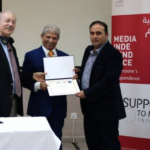 Last week the first of several trainings on the implementation of the Access to Information (ATI) Law was held at the National Library in Amman. The first 3-day training session is one of five sessions being organized jointly by UNESCO Amman Office, Centre for Law and Democracy (CLD) and Department of the National Library as part of the EU funded and UNESCO implemented “Support to Media in Jordan” Project.
Last week the first of several trainings on the implementation of the Access to Information (ATI) Law was held at the National Library in Amman. The first 3-day training session is one of five sessions being organized jointly by UNESCO Amman Office, Centre for Law and Democracy (CLD) and Department of the National Library as part of the EU funded and UNESCO implemented “Support to Media in Jordan” Project.
The trainings, taking place between January and March 2017, are targeting all 60 information officials in every government Ministry and other public bodies in Jordan, as well as several journalists and local trainers from non-governmental organizations and other bodies who will be able to carry on future training.
“UNESCO is pleased to be once again partnering with the National Library as well as the Centre for Law and Democracy on the ATI training. We hope that this training will help in mainstreaming the right to information in the Jordanian public service, and in turn improving the overall freedom of expression environment for not only media but all citizens in the country,” said Ms. Hanadi Gharaibeh, Associate Project Officer at UNESCO.
The trainings will cover topics such as the importance of the right to information, global trends, legal foundations including international law and the Jordanian legal framework, as well as issues such as proactive disclosure, how to process information requests and appeals, and how to interpret exceptions in the Law. The full UNESCO-CLD ATI Training Manual is available in Arabic and English.
“For the first time in over 10 years, all of the information officials in Jordan will receive this sort of training. It is a huge step forward. But we also know that for a culture of disclosure to flourish, there needs to be a system of ongoing training for other public servants at each public body,” added Mr. Toby Mendel, Executive Director, CLD.
“The training is part of a joint cooperation with UNESCO to raise awareness of the law and it implementation among government officials responsible for providing the information [to the pubic] and liaisons officers in particular. This will lead to more transparency, and it is a tool for anti-corruption,” added Mr Mohammed Yonis Abbadi, Information Commissioner and Director General of Department of the National Library. He noted that most ministries and public bodies have assigned an information officer to liaise with the Information Council, and that information request forms are now available at most government bodies and on their websites.
“The training was very useful. At the Ministry of Health, we are glad to be part of this training and learn more about how to handle information requests,” noted Mr. Hatem Azrui, the spokesperson and information officer at the Ministry of Health.
For a photo gallery of the first training session, see here.
—
Background information:
UNESCO is known as the ”intellectual” agency of the United Nations. At a time when the world is looking for new ways to build peace and sustainable development, people must rely on the power of intelligence to innovate, expand their horizons and sustain the hope of a new humanism. UNESCO exists to bring this creative intelligence to life; for it is in the minds of men and women that the defences of peace and the conditions for sustainable development must be built. UNESCO’s mission in Jordan is to work with the government of Jordan and other stakeholders to provide effective high quality educational, scientific, cultural and communication programmes.
Centre for Law and Democracy (CLD) is a non-governmental organization based in Halifax, Canada that works to promote, protect and develop human rights which serve as the foundation for or underpin democracy, including the rights to freedom of expression, to vote and participate in governance, to access information and to freedom of assembly and association.
The Department of the National Library was established in 1977 as one of the departments of the Ministry of Culture. The department and the Center for Documents were merged into the National Library in 1994. Its main tasks include: keeping, organizing and introducing to the public the national intellectual product issued both inside and outside Jordan, collecting and keeping books, manuscripts, periodicals, photographs, recordings, videotapes, and other materials relevant to Jordanian heritage in particular, to the Arab world and to Arabic and Islamic civilization as well as to human heritage in general, as well as collecting government documents from ministries and public departments and institutions. The National Library provides logistical and administrative services to the Information Council and the Commissioner. According to the Access to Information Law, the Director of the National Library is the Information Commissioner and deputy of the President.
For more information, please contact:
Lidija Sabados (English)
Associate Project Officer, Support to Media in Jordan
UNESCO Amman Office
l.sabados@unesco.org
Tel.: +962 (6) 5929621 Ext 328
Mob.: +962 (7) 96830012
Dina Baslan (Arabic and English)
Coordinator, Centre for Law and Democracy
dina.baslan@gmail.com
Mob.: +962 (7) 77300069



